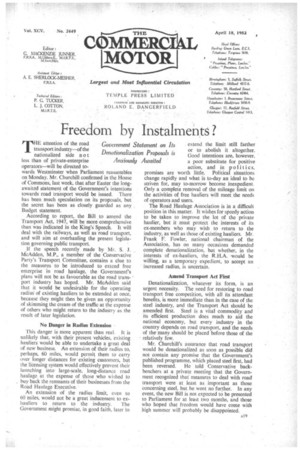Freedom by Instalmehts ?
Page 21

If you've noticed an error in this article please click here to report it so we can fix it.
THE attention of the road transport industry—of the nationalized side n o t less than of private-enterprise operators—will be directed towards Westminster when Parliament reassembles on Monday. Mr. Churchill confirmed in the House of Commons, last week, that after Easter the longawaited statement of the Government's intentions towards road transport would be issued. There has been much speculation on its proposals, but the secret has been as closely guarded as any , Budget statement.
According to report, the Bill to amend the Transport Act, 1947, will be more comprehensive than was indicated in the King's Speech. It will deal with the railways, as well as road transport, and will aim at overhauling the present legislation governing public transport.
if the speech recently made by Mr. S. J. McAdden, M.P., a member of the Conservative Party's Transport Committee, contains a clue to the measures to be introduced to extend free enterprise in road haulage, the Government's plans will not be as favourable as the road transport industry has hoped. Mr. McAdden said that it would be undesirable for the operating radiusof existing hauliers to be extended at once, because they might then be given an opportunity of skimming the cream of the traffic at the expense of others who might return to the industry as the result of later legislation.
No Danger in Radius Extension • This danger is more apparent than real. It is unlikely that, with their present vehicles, existing hauliers would be able to undertake a great deal of new business. An extension of their radius to, perhaps, 60 miles, would permit them to carry over longer distances for existing customers, but the licensing system would effectively prevent their launching into large-scale, long-distance road haulage at the expense of those who wished to , buy back the remnants of their businesses from the Road Haulage Executive.
An extension of the radius limit, even to 60 miles, would not be a great inducement to exhauliers to return to the industry. The Government might promise, in good faith, later to extend the limit still farther or to abolish it altogether. Good intentions are, however, a poor substitute for positive action, and in politic s, promises are worth little. Political situations change rapidly and what is to-day an ideal to be striven for, may to-morrow become inexpedient. Only a complete removal of the mileage limit on the activities of free hauliers will meet the needs of operators and users.
The Road Haulage Association is in a difficult position in this matter. It wishes for speedy action to be taken to improve the lot of the private haulier, but it must protect the interests of its ex-members who may wish to return to the industry, as well as those of existing hauliers. Mr. Frank F. Fowler, national chairman of the Association, has on many occasions demanded complete denationalization, but whether, in the interests of ex-hauliers, the R.H.A. -would be willing, as a temporary expedient, to accept an increased radius, is uncertain.
Amend Transport Act First Denationalization, whatever its form, is an urgent necessity. The need for restoring to road transport free competition, with all its attendant benefits, is more immediate than in the case of the steel industry, and the Transport Act should be amended first. Steel is a vital commodity and its efficient production does much to aid the national economy, but every industry in the country depends on road transport, and the needs of the many should be placed before those of the relatively few.
• Mr. Churchill's assurance that road transport would be denationalized as soon as possible did not contain any promise that the Government's published programme, which placed steel first, had been reversed. He told Conservative backbenchers at a private meeting that the Government recognized that measures to deal with road transport were at least as important as those concerning steel, but he went no further. In any event, the new Bill is not expected to be presented to Parliament for at least two months, and those who hoped that freedom would have come with high summer will probably be disappointed.












































































